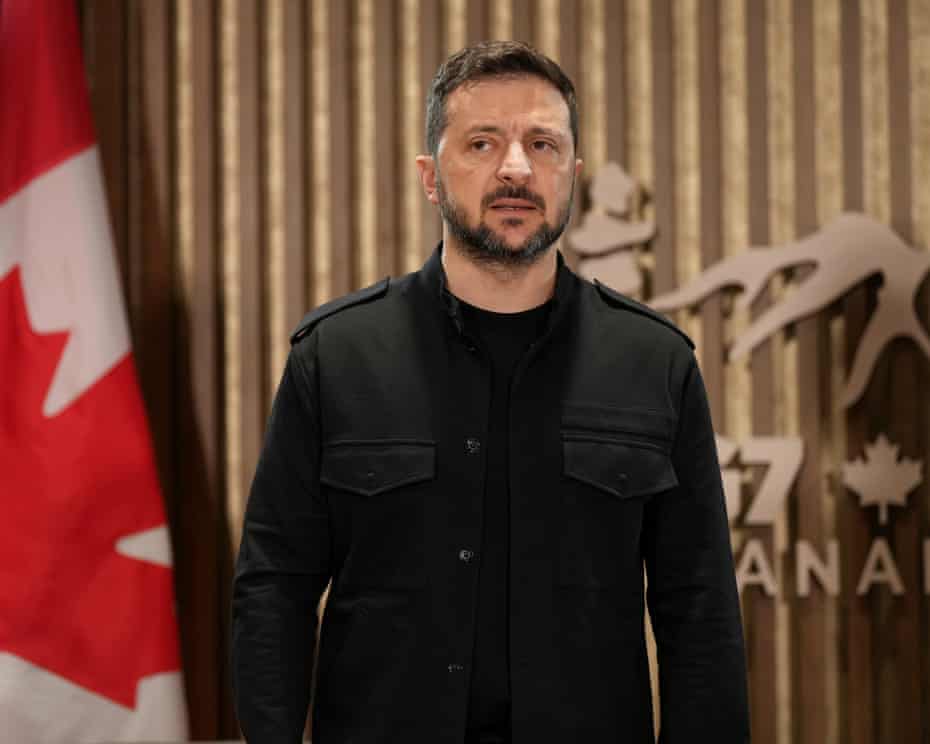Ukrainian diplomats were left disheartened, and in some quarters embittered, after US President Donald Trump abruptly exited the G7 summit in Canada just hours before a highly anticipated bilateral meeting with President Volodymyr Zelenskyy. Trump’s departure, reportedly to “focus on the Israel-Iran conflict” has cast doubt over America’s commitment to Ukraine at a time of deepening Russian aggression.
President Zelenskyy had travelled more than 5,000 miles in the hopes of securing vital US backing, including a proposed arms deal worth between $30bn and $50bn, and gaining ground on collective Western pressure for a ceasefire with Russia. Instead, he found himself at a summit where the central figure, the US president, had vacated his seat and vetoed a joint G7 statement on Ukraine, branding it “too anti-Russian” and potentially harmful to negotiations with Vladimir Putin.
The diplomatic slight, though not voiced publicly due to Kyiv’s need to maintain Washington’s goodwill, was palpable. One senior Ukrainian official admitted: “It’s a permanent hazard that Ukraine is a victim of events and Trump’s short attention span. Putin knows that. Maybe that’s why there was such a massive attack on Ukraine last night.”
Zelenskyy present at special G7
With the US chair at the summit left empty, Zelenskyy attended a special G7 session on Ukraine with the remaining leaders. But the strategic aim, to rally Trump’s support in pressing Moscow towards a ceasefire, had already collapsed. Adding salt to the wound, Zelenskyy received updates of fresh Russian missile strikes en route to the meeting.
At a sombre press conference with Canadian Prime Minister Mark Carney, Zelenskyy avoided direct criticism of Trump, saying only: “We need the help of our allies for our soldiers to stay strong until Russia is ready for peace negotiations.” He reiterated Ukraine’s readiness for an “unconditional ceasefire.”
Trump’s move to block the joint statement and sidestep direct engagement also stifled discussion around other pressing issues. Ukraine had hoped to win US support for lowering the G7’s oil price cap from $60 to $45 a barrel, a move designed to slash Russia’s oil revenues. While European Commission President Ursula von der Leyen acknowledged the debate, she noted that the urgency had been somewhat blunted by a recent surge in oil prices due to tensions in the Middle East.
British Prime Minister Keir Starmer, however, used the summit to renew calls for a tougher oil cap, unveiling new sanctions against 20 Russian oil tankers and companies managing them. “We must deplete Russia’s war chest,” he said, urging allies to tighten restrictions on Russian crude.
The EU, meanwhile, is finalising an 18th sanctions package. It includes a novel clause: banning imports of Russian oil refined in third countries unless importers can prove the product’s origin. New rules will also require member states to publish strategies for reducing dependence on Russian fossil fuels.
EU foreign policy chief Kaja Kallas struck a firm tone from Brussels, condemning Russia’s latest attacks on Ukrainian civilians. “Russia remains unrelenting. This is yet another sign: Russia is not interested in peace. We must keep up the pressure,” she said.
Kallas pointed to early signs that sanctions are beginning to bite. Russia’s sovereign wealth fund fell from $42bn to $36bn in May alone, and oil exports via the Black and Baltic Seas dropped by 30% following the last sanctions round.
“Only by cutting off revenue streams can we prevent Russia from refilling its war chest,” she asserted.
Yet for Kyiv, the absence of firm US leadership at the G7 is a stark reminder of shifting sands. Zelenskyy’s aides are now reconsidering whether he should attend next week’s NATO summit in The Hague, amid uncertainty over Trump’s presence.
German Chancellor Friedrich Merz insisted Trump had promised to attend the NATO gathering but in a world of fractured alliances and unpredictable commitments, few in Kyiv are taking that to the bank.
As the war grinds on and diplomatic opportunities dwindle, Ukraine finds itself not just fighting a relentless adversary in Moscow but increasingly, the weariness and wavering priorities of the West.



